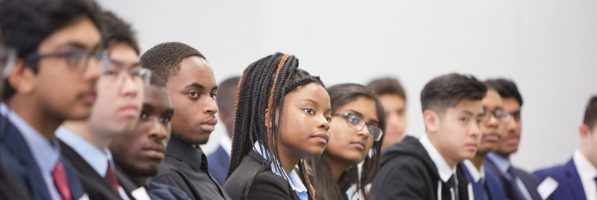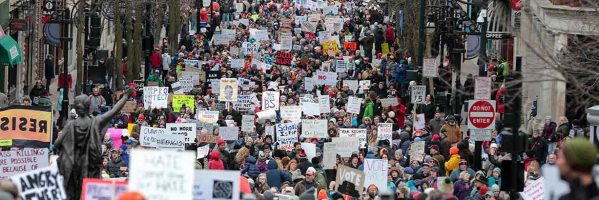Northwestern Kellogg Hosts Landmark Global Women’s Summit

Women now make up more than half of all incoming students to the top U.S. universities, but only a small fraction of those women go on to work as CEOs, board directors, or NGO and government leaders. To start to tackle the problem, next week, Northwestern Kellogg’s School of Management will host the first-ever Global Women’s Summit on May 8 and 9. The landmark event will bring together more than 800 alumnae, students, guests, and community members to spark meaningful conversations about the roadblocks that women face on their way to the C-suite.
The Global Women’s Summit will be broken down into three areas, or pivot points, which Kellogg believes have the most impact on the career barriers that women face.

- Launch Track: For women who are just started out their career in their first ten years after college. Sessions include:
- Ten things to do now to set yourself up for long-term success.
- Building relationships with intention and value.
- Mid-Career Track: For women who have ramped up their work responsibilities and outside work commitments. Sessions include:
- Top three reasons to stay in the game.
- Succeeding and leading in a biased world.
- Executive Track: For women who have made it into the upper echelons of their organizations and are either getting ready for the C-suite or are already there. Sessions include:
- Positioning yourself for a board seat.
- The likeability dilemma.
The summit schedule will allow women to choose sessions that best fit where they are in their career so that they only attend those workshops and discussions that meet their individual needs. It’s a unique setup that allows women to spend time with other women at similar career stages.
 Many incredible speakers will participate in the event, including:
Many incredible speakers will participate in the event, including:
- Sheryl Lansing, former CEO of Paramount Pictures
- Carol Lavin Bernick, the CEO of Polished Nickel Capital Management
- Cindi Bigelow, the president and CEO of Bigelow Tea
- Ann M. Drake, chairman and CEO of DSC Logistics Inc.
- Gloria Guevara, president and CEO of World Travel and Tourism Council
- Full list of speakers here.
To learn more about the Global Women’s Summit head on over to the website. There will also be 14 sessions available to stream live throughout the event.
This article has been edited and republished from our sister site, Clear Admit.
Kellogg Investigates Impact of Automation on Smaller Cities, and More – Chicago News

Let’s explore some of the most interesting stories that have emerged from Chicago business schools this week.
How Will Automation Affect Different U.S. Cities? – Kellogg Insights
Northwestern University Kellogg School of Management‘s Hyejin Youn, an assistant professor of management and organization, just published new research in which she and her colleagues explore the unique industrial impacts of automation on different cities across the country.
Youn predicts that automation will have a more pronounced impact on smaller cities whose industries are populated by easily automated jobs (think card dealers, cashiers, and accountants). These cities are likely to experience a hollowed out middle class precipitated by “an exodus of workers, as well as exacerbated income inequality.”
According to the article, larger cities with greater “shares of managerial and knowledge professions (like lawyers, scientists, and software developers), [which] require knowledge and skills that cannot easily be taught to a machine, they will offset the total impact of automation.”
You can learn more about Youn’s research here.
More Than Jobs Than Job Seekers in Elkhart – Mendoza Ideas & News
Fox 26 Houston recently interviewed Notre Dame Mendoza College of Business finance professor Jason Reed about a fascinating discovery that there are “more job openings in Elkhart, Indiana, than there are workers to fill them.” According to recent Labor Department statistics, this news is indicative of the realities of many communities in the Midwest.
You can watch the entire interview below.
In many cities there are never too many job openings, but here’s one city where the economy is so good that there are more jobs than there are workers to fill them. Fox News’ @MattFinnFNC reports. pic.twitter.com/lwfBAhGaBz
— Ivory Hecker FOX 26 (@IvoryHecker) April 9, 2018
Are You Ready For Personalized Pricing? – Booth Business Blog
University of Chicago Booth School of Business professors Sanjog Misra and Jean-Pierre Dubé have published new research that many companies have begun exploring “personalized pricing” or tailoring their prices to individual customers—a practice that dates back at least 150 years to the days of haggling with Wanamaker’s sales staff but is relatively nascent in the era of Amazon.
According to the article, the researchers found that by “testing a range of introductory prices for online job board ZipRecruiter, the company could have more than doubled its standard price of $99, increasing revenues despite the smaller number of customers willing to pay more.”
The practice is not without potential controversy, as Dubé explains: “In markets where prices are transparent and customers can easily figure out what other people are paying, that’s where you run the risk of a backlash.”
Learn more about the duo’s research here.
The Connection Between Social Mobility and Democracy, and More – Chicago News

Let’s explore some of the most interesting stories that have emerged from Chicago business schools this week.
Is Social Mobility Essential to Democracy? – Kellogg Insights
Northwestern University Kellogg School of Management professor of managerial economics and decisions sciences Georgy Egorov, along with MIT Sloan’s Daron Acemoglu and Chicago Booth’s Konstantin Sonin, recently created a model to understand how voters’ beliefs about social mobility affect their political preferences.
Despite older generations becoming increasingly less optimistic with the potentially positive outcomes of future generations, the researchers find that there’s a decent probability that the children of future generations will rise to a higher economic and social class.
“Having many election cycles means that even with low mobility, the likelihood that a person’s decedents will eventually end up in another class is high. Egorov compares it to two lakes connected by a narrow straight. In the short term, they will not exchange much water. But over the long term, that small exchange will grow and grow until the waters are quite mixed.”
Speaking with Kellogg Insights, Egorov elaborated:
“In a certain sense, expectation of stability begets stability. A thick middle class makes democracy more stable than a thin one. Our research highlights the problems that may follow from a shrinking or thin middle class. Additionally, if the belief in the stability of democracy is undermined, people might well decide it’s not worth defending.”
You can read more about the trio’s research here.
Mendoza Marketing Professor Wins Research Award – Mendoza Ideas & News
The 2018 Louis W. Stern Award has officially been bestowed upon Shankar Ganesan, the John Cardinal O’Hara, C.S.C., professor of business and marketing department chair at the Notre Dame University Mendoza College of Business.
The award recognizes Ganesan, as well as co-authors Steven P. Brown of the University of Houston, Babu John Mariadoss of Washington State and Hillbun (Dixon) Ho of University of Technology Sydney for a 2010 article they published in the Journal of Marketing Research entitled, “Buffering and Amplifying Effects of Relationship Commitment in Business-to-Business Relationships.”
According to the article, “The paper examines the buffering and amplifying effects of relationship commitment on organizational buyers’ intentions to switch suppliers when a relationship is strained by the incumbent’s own misbehavior. “
Check out more from Ganesan’s research here.
The Road Ahead: Takeaways from Economic Outlook 2018 – Chicago Booth Magazine
Chicago Booth Magazine recently dove into the sold-out ‘Economic Outlook 2018’ event last January to “evaluate emerging trends [and] share their insights into the economic outlook for Wall Street and Main Street—ten years after the financial crisis.”
Randall S. Kroszner, the Chicago Booth Norman R. Bobins professor of economics, offered a few optimistic projections:
“I do think [the tax cut] is going to have a positive impact, both in the short run and the long run. I think the broad direction is fairly clear: cutting personal tax rates on a weighted average, of about three percent or so, will have positive impact on demand, because that’s going to allow for higher disposable income in the short run.”
Austan D. Goolsbee, Robert P. Gwinn professor of economics and the former chairman of the Council of Economic Advisers, offered slightly more tempered but optimistic projections as well:
“The danger areas continue to be worries about China, where there has been a big acceleration of debt, and a nagging feeling that we really don’t know what’s in the European financial institutions. That said, the overall growth around the world is looking a little better, for the first time in a little while.”
You can read more about Booth’s ‘Economic Outlook 2018’ overview here.
NRA Boycotts, Food Deserts, and More – Chicago News

Let’s explore some of the most interesting stories that have emerged from Chicago business schools this week.
How the NRA Boycotts Force Companies to Walk a Precarious Tightrope – Kellogg Insights
In light of the recent Parkland and Great Mills school shootings, which attracted an estimated 200,000 protestors to the March For Our Lives rally in Washington DC late last month, Northwestern University Kellogg School of Management professors Brayden King and Tim Calkins discussed what companies susceptible to boycotts can do to build “strong, profitable brands.” Calkins explains the stakes of the game right now:
“The world of transparency we’re in combined with the world of social media means brands have to be very careful about what they’re doing, really scrutinize things in a way they never used to. All of a sudden, they’ve got a problem because of something they never even knew they were doing.”
“That certainly was the case with the NRA boycotts. I think if you were to ask a lot of these executives at these companies, “Do you offer special deals to the NRA?” most of them would have said, “No, we don’t have a partnership with the NRA.” It’s incredibly difficult right now to figure out how to respond. You have to move so quickly, but if you’re not careful, you’ll just make the problem bigger with a tone-deaf response.”
You can read the duo’s entire discussion here.
Nutrition Gap Between Rich and Poor is Growing, but Don’t Blame Food Deserts, Researchers Say – Chicago Booth Blog
Research from Chicago Booth professor of marketing Jean-Pierre Dubé, along with NYU’s Hung Allcott and Stanford’s Rebecca Diamond that reveals the minimal impact that food deserts have on eating habits. Dubé explains:
“One of the conclusions in our study is that opening a supermarket in a food desert has very little impact on the nutritional composition of households’ shopping baskets. People in food deserts shop in supermarkets almost as frequently as people living in higher income neighborhoods. They just travel longer distances to stores.”
The study found several variances of why these events were occurring, including vast educational differences and the willingness for upper-class consumers to pay more for vegetables and other produce.

“Food knowledge and education seem to explain a big chunk of the preferences for what people buy when they shop for groceries,” said Dubé. “If you are educated about the long-term benefits of nutrition, it could affect your shopping behavior.”
Learn more about the trio’s research here.
UIC Business Tackles “Back to College” with Target – UIC Business Blog
UIC Liautaud announced the results of its 2018 Management Leadership Association and Target Case Competition, an annual partnership between Target and the UIC Business Career Center, which invites “students to develop and present solutions to a unique challenge facing the company.”
Team Bersaglio’s “Target Move-In” proposal took first place, which attempted to eliminate the hassle for college students to “store items over the summer in preparation for college.”
The plan offered that students living on campus would “receive free shipments via specialized Target college gift registry” and could retrieve “purchases from a designated “Target Zone” on campus and receive customer service support and delivery assistance carrying packages to the dorms on move-in days.”
Read more about the competition here.
Why McKinsey & Company Loves Hiring MBAs

McKinsey & Company is considered one of the most prestigious management consultancy firms in the world, with a clientele that includes 80 percent of the world’s largest corporations, along with an extensive list of governments and non-profit organisations. The firm is also a prestigious landing spot for MBAs following graduation. Continue reading…
Chicago Booth Talks Suspect Stock Trading, and More – Chicago News

Let’s explore some of the most interesting stories that have emerged from Chicago business schools this week.
Why Do Investors Seek out Stock Swindles? – Chicago Booth Blog
The University of Chicago Booth School of Business (the new number one business school in the country according to U.S. News) recently published new research that uncovers an unfortunate gambling problem among some German investors who “buy suspect stocks for the thrill of it, even when they know better.”
Booth Professor Christian Leuz collaborated with Leibniz University of Hanover’s Steffen Meyer, Humboldt University of Berlin’s Maximilian Muhn, Harvard’s Eugene Soltes, and Goethe University of Frankfurt’s Andreas Hackehtal on a new working paper entitled, “Who Falls Prey to the Wolf of Wall Street? Investor Participation in Market Manipulation,” which examines “the German stock market, asking who invests in these schemes and how often.”
“Of these investors, 6,569 individuals—nearly 6 percent of the sample—took part in pump-and-dump schemes, investing an average 11.4 percent of their portfolio’s overall value and sustaining an average loss of nearly 30 percent.”
Read more about the quintet’s stock trading research here.
2018 MBA Chile Immersion – Mendoza College of Business Blog
Students from the University of Notre Dame Mendoza College of Business recently embarked on a five-day study abroad trip to Santiago, Chile, where they “toured some of the most innovative and philanthropic local businesses.” In early March, the group paid a visit to fruit producer Vista Hermosa, based in the Central Zone of Chile (Melipilla). Vista Hermosa’s mission is to “produce good quality fruit and have control of it from its harvest until it is shipped to different markets.” The company gives “special emphasis to the care of the environment, protecting the native flora and fauna, as well as the efficient use of fertilizers and agrochemicals.” According to one student testimonial:
“Our visit consisted of a tour of both the farm and the packing plant to better understand the production and fruit export process. There is a small church on the farm grounds available for the employees who live on the farm. We were treated to fresh pears and cherries, the latter of which is one of the farms biggest exports.”
You can read more about the Mendoza’s Chilean itinerary here and watch the student’s day one diary of the trip below.
Trying to Be Persuasive? Here’s What You Are Likely Doing – Kellogg Insight
Northwestern University Kellogg School of Management professor of marketing Derek Rucker and associate professor of management and organizations Loran Nordgren recently published new research that attempts to offer a glimpse into how “people use language in persuasion.” The duo found that “participants’ language tends to become more emotional when they are motivated to persuade others to buy a product.” Rucker elaborates:
“The gravity of emotional language is hard to escape, even when you know the audience wants to hear a more cognitive appeal. We observe that people express more emotion even in categories where that might be odd and potentially less effective. When it comes to influence, emotion is arguably the earliest form of communication we have.”
Check out more of the duo’s research here.
